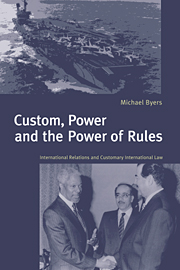Book contents
- Frontmatter
- Contents
- Foreword by James Crawford
- Preface
- Acknowledgments
- Table of cases
- Table of treaties
- List of abbreviations
- Part 1 An interdisciplinary perspective
- Part 2 International law and the application of power
- Part 3 The process of customary international law
- 8 Fundamental problems of customary international law
- 9 International relations and the process of customary international law
- 10 Related issues
- 11 Conclusions
- Bibliography
- Index
9 - International relations and the process of customary international law
Published online by Cambridge University Press: 22 September 2009
- Frontmatter
- Contents
- Foreword by James Crawford
- Preface
- Acknowledgments
- Table of cases
- Table of treaties
- List of abbreviations
- Part 1 An interdisciplinary perspective
- Part 2 International law and the application of power
- Part 3 The process of customary international law
- 8 Fundamental problems of customary international law
- 9 International relations and the process of customary international law
- 10 Related issues
- 11 Conclusions
- Bibliography
- Index
Summary
In thinking about the chronological paradox, the problem of State practice, the epistemological circle and the problem of inferred consent, it may help to consider the customary process from the perspective of international relations theory. Before doing so, it bears repeating that this book does not set out a new normative theory of customary international law. Instead, it seeks to cast light on traditional, theoretical problems of customary international law by considering factors which are not strictly legal in character.
On the basis of the definitions provided by Keohane and Young, the process of customary international law is clearly an institution. In Keohane's terms, it is a persistent and connected set of informal rules which prescribe behavioural roles, constrain activity and shape expectations. In Young's terms, it is an identifiable social convention which results from the convergence of patterned behaviour and actor expectations, and to which States conform without making elaborate calculations on a case-by-case basis. The similarities between Young's definition of institutions and traditional definitions of customary international law, namely the convergence of State practice and opinio juris, are striking.
The process of customary international law would also seem to fit within the scope of the well-known definition of international regimes provided by Krasner et al., namely, ‘sets of implicit or explicit principles, norms, rules and decision-making procedures around which actors’ expectations converge in a given area of international relations'.
- Type
- Chapter
- Information
- Custom, Power and the Power of RulesInternational Relations and Customary International Law, pp. 147 - 165Publisher: Cambridge University PressPrint publication year: 1999



